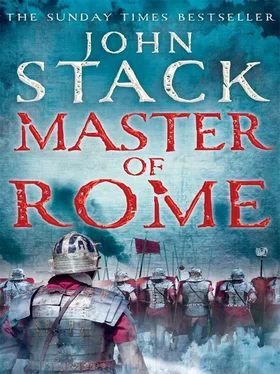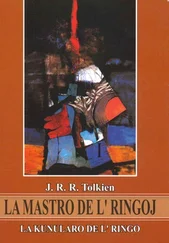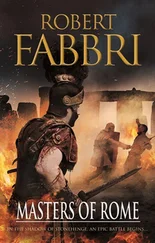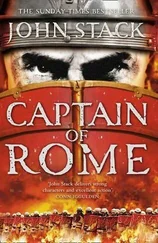John Stack - Master of Rome
Здесь есть возможность читать онлайн «John Stack - Master of Rome» — ознакомительный отрывок электронной книги совершенно бесплатно, а после прочтения отрывка купить полную версию. В некоторых случаях можно слушать аудио, скачать через торрент в формате fb2 и присутствует краткое содержание. Жанр: Исторические приключения, на английском языке. Описание произведения, (предисловие) а так же отзывы посетителей доступны на портале библиотеки ЛибКат.
- Название:Master of Rome
- Автор:
- Жанр:
- Год:неизвестен
- ISBN:нет данных
- Рейтинг книги:4 / 5. Голосов: 1
-
Избранное:Добавить в избранное
- Отзывы:
-
Ваша оценка:
- 80
- 1
- 2
- 3
- 4
- 5
Master of Rome: краткое содержание, описание и аннотация
Предлагаем к чтению аннотацию, описание, краткое содержание или предисловие (зависит от того, что написал сам автор книги «Master of Rome»). Если вы не нашли необходимую информацию о книге — напишите в комментариях, мы постараемся отыскать её.
Master of Rome — читать онлайн ознакомительный отрывок
Ниже представлен текст книги, разбитый по страницам. Система сохранения места последней прочитанной страницы, позволяет с удобством читать онлайн бесплатно книгу «Master of Rome», без необходимости каждый раз заново искать на чём Вы остановились. Поставьте закладку, и сможете в любой момент перейти на страницу, на которой закончили чтение.
Интервал:
Закладка:
Over a year ago he had sailed south in triumph from Cape Ecnomus. He had met the Carthaginian army at Adys and swept them aside, had taken Tunis without a fight and had plundered the land around Carthage. The war was won, the enemy beaten on all fronts and, conscious that his consulship was nearing its end and that a successor could arrive any day from Rome to steal his victory, he had confidently sent envoys to Carthage with his terms for their surrender: abandon Sicily, disband the navy and admit total defeat.
Even now Regulus remembered the anger he had felt when the Carthaginians refused his terms. Thereafter he had spent every waking hour preparing his army for the moment the enemy would dare to step outside the city. They had emerged, a new leader at their head, and Regulus had marched on to the plains south of Tunis, ready to deliver the fatal blow that would finally subdue the Carthaginians.
But that victory had been snatched from him, replaced with ignominious defeat, and Regulus cursed Fortuna for the ruination of his fate. He strode to the shuttered window and squinted through a crack in the timber to gaze at the city of Tunis spread out before him. In the distance, a dark pall of smoke rose from the plain, the funeral pyre of the battlefield, and Regulus whispered a prayer once more for the lives of twelve thousand men.
‘We should attack now,’ Xanthippus said as he followed Hamilcar across the battlements, ‘before the enemy becomes entrenched.’
‘No, I cannot risk the destruction of the Roman fleet. I need those galleys intact. We will wait,’ Hamilcar replied, turning to look out from the heights of the fortress over the city of Tunis, the late evening sunlight reflecting off the taller buildings. His gaze settled on the pillar of smoke to the south, its tentacles reaching towards the city, borne on by the eternal wind, the ghibli. The fires had been burning since dawn the day before, when Hamilcar had witnessed the lighting of the pyres under the Carthaginian slain, their bodies ceremoniously committed to Mot, the god of death, while nearby the Roman carrion were put to the torch, a separate fire to which Hamilcar had added ten more bodies — those of the members of the council of Tunis who had opened the gates of the city to the Romans.
‘You think this Roman will order his men to surrender?’ Xanthippus asked, following the Carthaginian’s gaze.
‘Regulus will comply,’ Hamilcar said with certainty. ‘He knows their situation is hopeless.’
‘Then surely those men know it too,’ Xanthippus replied. ‘Perhaps they have already surrendered.’
Hamilcar turned to the Spartan, a smile on his face. ‘They have not surrendered,’ he said. ‘Nor will they under force of arms.’
‘You are sure?’ Xanthippus said.
Hamilcar nodded. ‘I am sure,’ he replied. ‘For I know the resolve of the man who commands there.’
Over the previous year, Hamilcar had been determined to discover the identity of the lone captain who had frustrated his attack at Ecnomus. Learning that he had survived and had been promoted for his actions, Hamilcar had burned the man’s name into his mind, searching for it in every spy’s report that crossed his desk, tracking his movements during the course of the campaign, waiting for an opportunity to avenge his defeat at Ecnomus.
‘Who is this Roman?’ Xanthippus asked, seeing the expression of hostility on the Carthaginian’s face.
‘He is not Roman, he is Greek, like you,’ Hamilcar said, the words spoken slowly as the strength of his conviction coursed through him. ‘And when I have Regulus’s order, I will deliver it to this man and accept his surrender personally.’
Hamilcar turned from Xanthippus and looked to the east, the horizon rapidly slipping into darkness as the sun fell away in the west. In his mind’s eye he pictured the port of Aspis and the enemy within, his mouth forming the name of his foe. Perennis.
Atticus ran his hand along the forerail of the Orcus as he stared out across the thousand yards to the Carthaginian blockade, the two hundred dark-hulled quinqueremes slowly taking shape in the dawn light. He looked to the galleys of his command, each one with its bow facing the mouth of the harbour, the outgoing tide stretching their stern anchor lines behind them as if the ships themselves were eager to be let loose on the enemy after four days of silently watching the Carthaginian galleys.
‘Dawn, at last,’ Septimus said as he came up to the foredeck, his eyes red-rimmed from lack of sleep, his face darkened by stubble.
Atticus nodded, the tension in his stomach easing, feeling the same relief at the sight of the rising sun. He had spent the night on deck, as had all his crew for the past four nights, ready for an attack that had never come, silently watching the Carthaginian running lights sweep slowly across the horizon under the star-filled, moonless sky, the enemy visibly holding station.
‘Day five,’ Atticus remarked, frustration in his voice.
‘And still no advance,’ Septimus said, finishing his friend’s thought. ‘You’re still sure they’ll attack at night?’ he asked after a moment’s pause.
‘I would,’ Atticus replied. ‘The confines of the harbour protect our flanks and reduce their advantage in numbers. They could attack by day but it would be a costly victory. A surprise attack at night would be their best bet.’
Septimus nodded, knowing also of the terrifying confusion that would accompany a night attack, chaos that would be an ally to the aggressors. He looked to the rising sun and then to the enemy, their formation the same as it had been when he last saw it at dusk the evening before. He tightened his grip on the hilt of his sword and silently muttered a challenge to the Carthaginians, daring them to make their play.
The bireme moved quickly through the swarm of larger galleys, the helmsman giving way to the towering quinqueremes as he skilfully exploited the agility of the smaller ship. Hamilcar stood beside him at the tiller, watching the crewman at work, admiring the display of prowess, a skill Hamilcar suspected had been taught to the helmsman by his father or grandfather in the tradition of all Carthaginian naval families.
Hamilcar looked to the multitude of galleys surrounding him, noticing their clean lines and ordered formation, the efficiency of the crews clearly evident even after five days of monotonous duty. The bireme progressed smoothly and Hamilcar glanced to his right, catching glimpses of the inner harbour of Aspis between the moving galleys, the stationary Roman ships indistinguishable across a thousand yards of water. A shouted hail caught his attention and he looked to the fore once more, the familiar galley ahead a welcome sight.
The bireme moved swiftly alongside the Alissar and, as it nudged the hull, Hamilcar jumped on to the rope ladder and ascended to the main deck.
‘Well met, Commander,’ Himilco the captain said as he extended his hand.
Hamilcar took it. ‘Report, Captain,’ he said brusquely.
‘As you predicted, Commander,’ Himilco began. ‘The Romans have made no move to surrender.’
Hamilcar smiled grimly and nodded, looking once more to the inner harbour, his view now unobstructed. The sight prompted him to reach into his tunic and he took out a brass cylinder, fingering it lightly as he turned once more to Himilco.
‘Come about, Captain,’ he ordered. ‘Take us in to the harbour.’
‘We are to attack?’ Himilco asked.
‘No, signal the fleet. Tell them to hold station: we go alone.’
Himilco saluted and within moments the Alissar broke formation and turned her bow to the inner harbour. Hamilcar looked to the cylinder in his hand, his expectation tightening his grip on the container. Within minutes he would finally be able to put a face to his enemy.
Читать дальшеИнтервал:
Закладка:
Похожие книги на «Master of Rome»
Представляем Вашему вниманию похожие книги на «Master of Rome» списком для выбора. Мы отобрали схожую по названию и смыслу литературу в надежде предоставить читателям больше вариантов отыскать новые, интересные, ещё непрочитанные произведения.
Обсуждение, отзывы о книге «Master of Rome» и просто собственные мнения читателей. Оставьте ваши комментарии, напишите, что Вы думаете о произведении, его смысле или главных героях. Укажите что конкретно понравилось, а что нет, и почему Вы так считаете.










